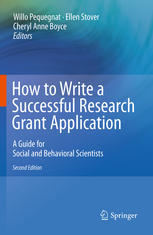

Most ebook files are in PDF format, so you can easily read them using various software such as Foxit Reader or directly on the Google Chrome browser.
Some ebook files are released by publishers in other formats such as .awz, .mobi, .epub, .fb2, etc. You may need to install specific software to read these formats on mobile/PC, such as Calibre.
Please read the tutorial at this link: https://ebookbell.com/faq
We offer FREE conversion to the popular formats you request; however, this may take some time. Therefore, right after payment, please email us, and we will try to provide the service as quickly as possible.
For some exceptional file formats or broken links (if any), please refrain from opening any disputes. Instead, email us first, and we will try to assist within a maximum of 6 hours.
EbookBell Team

4.4
32 reviewsHow to Write a Successful Research Grant Application
A Guide for Social and Behavioral Scientists, 2nd Edition
By Willo Pequegnat, Ellen Stover, and Cheryl Boyce
National Institute of Mental Health, Rockville, MD, USA
Over the last fifty years behavioral and medical research has been generously supported by the federal government, private foundations, and other philanthropic organizations contributing to the development of a vibrant public health system both in the United States and worldwide. However, these funds are dwindling and to stay competitive, investigators must understand the funding environment and know how to translate their hypotheses into research grant applications that reviewers evaluate as having scientific merit.
The Second Edition of How to Write a Successful Research Grant Application is the only book of its kind written by federal research investigators which provides technical assistance for researchers applying for biobehavioral and psychosocial research funding and can give them an edge in this competitive environment. The book provides invaluable tips on all aspects of the art of grantsmanship, including: how to determine research opportunities and priorities, how to develop the different elements of an application, how to negotiate the electronic submission and review processes, and how to disseminate the findings. Charts, visual aids, Web links, an extensive real-world example of a research proposal with budget, and a "So You Were Awarded Your Grant—Now What?" chapter show prospective applicants how to:
Although its focus is on Public Health Service funding, How to Write a Successful Research Grant is equally useful for all research proposals, including graduate students preparing a thesis or dissertation proposal. Service providers in community-based organizations and public health agencies will also find this a useful resource in preparing a proposal to compete for grant funds from state and community resources, non-government organizations, and foundations.